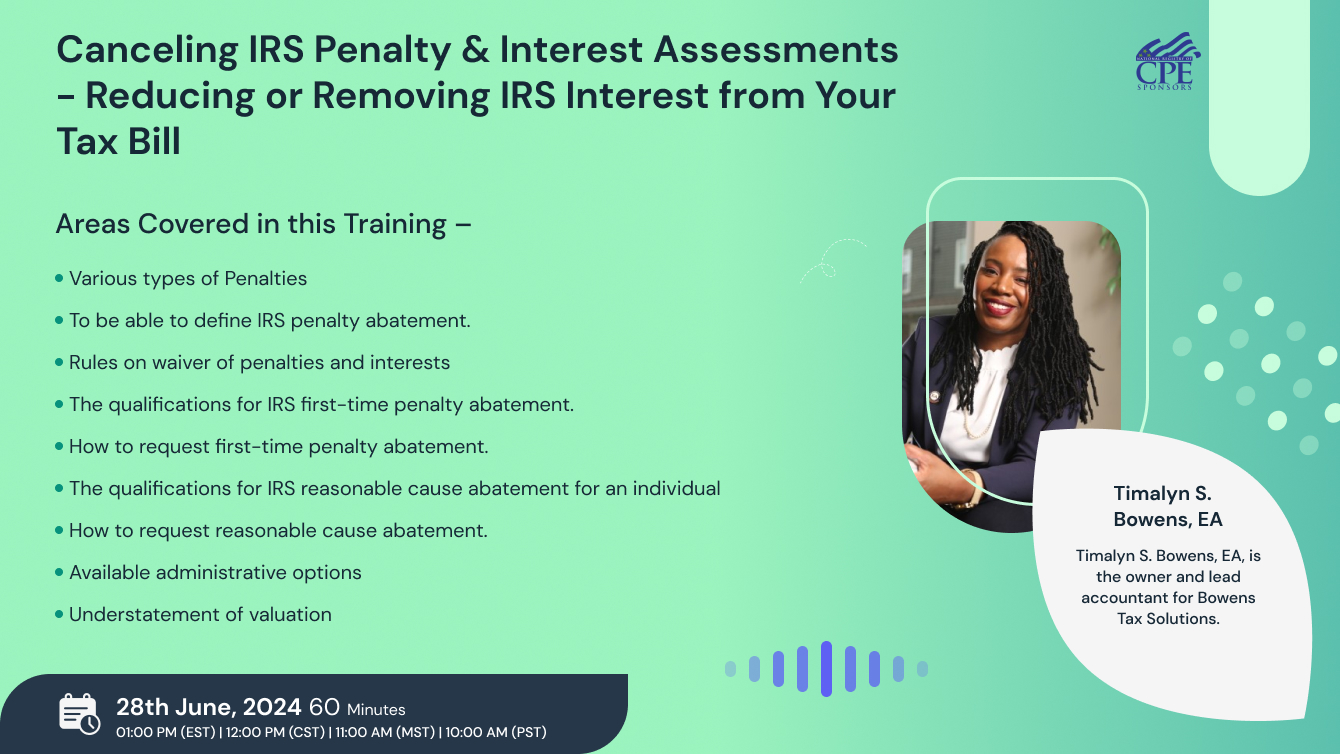Overview:
IRS penalties and interests increase the bill every day if your taxes are outstanding after the filing deadline. Taxpayers are liable for the additional penalties and interests on the entire outstanding amount even if they have qualified for a tax debt payment plan and have started to make payments.
The Internal Revenue Service (IRS) Penalty Abatement program provides relief for taxpayers who have been penalized for failing to file their tax returns, failing to pay their taxes on time, or making errors on their tax returns. This program allows taxpayers to request a reduction or elimination of the penalties and interest they have incurred. The trick is to convince the IRS that your client was unable to pay the taxes due to what the IRS tags a “reasonable cause.”
If a practitioner or taxpayer can justify that reasonable cause led to delay in tax payment, there are good chances that the IRS may forgive a portion or the entire penalty charged on your tax debt. Remember that IRS is softer on failure to pay penalties than failure to file penalties. To be eligible for IRS Penalty Abatement, taxpayers must have a valid reason for their failure to comply with the tax laws.
Areas covered in this Training:
· What is IRS penalty Abatement and Abatement of interest
· Avoiding the understatement of tax penalty
· Various types of penalties-
· Accuracy related
· Fraud
· Understatement of valuation
· Reporting requirement
· Failure to pay
· Pay or deposit penalties
· Rules on waiver of penalties and interests
· Various forms and procedures for requesting relief
· First Time Abatement: Requirements and procedures
· How an individual taxpayer qualifies for Reasonable Cause abatement -what are the qualifications
· Procedures for requesting refund of paid penalties
· How to request reasonable cause abatement - Available administrative options
Why Attend this Training:
Many penalties can be accrued by taxpayers that miss tax deadlines or payments. For compliant taxpayers, there can be administrative relief found through first- time penalty abatement. There is also leniency for taxpayers that have gone through a life circumstance known as a reasonable cause. This time, we’ll look at both first-time penalty and reasonable cause penalty abatement.
Many taxpayers incur IRS penalties, fees, and interest due to a lack of knowledge. IRS penalties and interests increase the bill every day if your taxes are outstanding after the filing deadline. Taxpayers are liable for the additional penalties and interests on the entire outstanding amount even if they have qualified for a tax debt payment plan and have started to make payments. Remember that IRS is softer on failure to pay penalties than failure to file penalties.
This webinar will help participants know how to request relief from these penalties from the IRS.
Suggested Attendees:
· Certified Public Accountants (CPAs)
· Enrolled Agents (EAs)
· Tax Professionals
· Tax Attorneys
· Other Tax Preparers
· Finance professionals
· Financial planners
· Non-credentialed tax professionals
· Annual Filing Season Preparers
· Tax professionals interested in learning how to abate penalties for taxpayers

Timalyn S. Bowens
Timalyn S. Bowens, EA, is an IRS-licensed enrolled agent who has been working in the tax industry for 11 years. She started Bowens Tax & Bookkeeping Solutions in 2016, helping small businesses keep their records straight and compliant with the IRS.
After becoming an enrolled agent in 2018, she began to fully help her clients negotiate with the IRS and represent them in audits. In 2021, her company became Bowens Tax Solutions as their primary focus is now to represent taxpayers before the IRS.
Timalyn is a member of the National Association of Enrolled Agents (NAEA) and the American Society of Tax Problem Solvers (ASTPS). She will be a speaker at an NAEA event later this year to train other tax professionals on a representation topic. She was also a speaker at the Tax and Accounting Summit of 2021.
In addition, Timalyn is a member of the Bellarmine University Alumni Board of Directors, where she serves on the mentor committee. She is also a Bellarmine University Alumni Ambassador, helping prospective students learn more about the university.
She serves as the treasurer on the board of TECH-nique, a nonprofit that helps girls of color get hands-on exposure to STEM. Timalyn also serves on a committee, S.O.S., which helps unhoused women in the Louisville Metro area.
Her blog, “Tax Tips with Timalyn,” educates taxpayers avoid issues with the IRS.

NASBA-
Standeagle is registered with the National Association of State Boards of Accountancy (NASBA) as a sponsor of continuing professional education on the National Registry of CPE Sponsors. State boards of accountancy have final authority on the acceptance of individual courses for CPE credit. Complaints regarding registered sponsors may be submitted to the National Registry of CPE Sponsors through its web site: www.nasbaregistry.org.

ACCREDITATIONS


